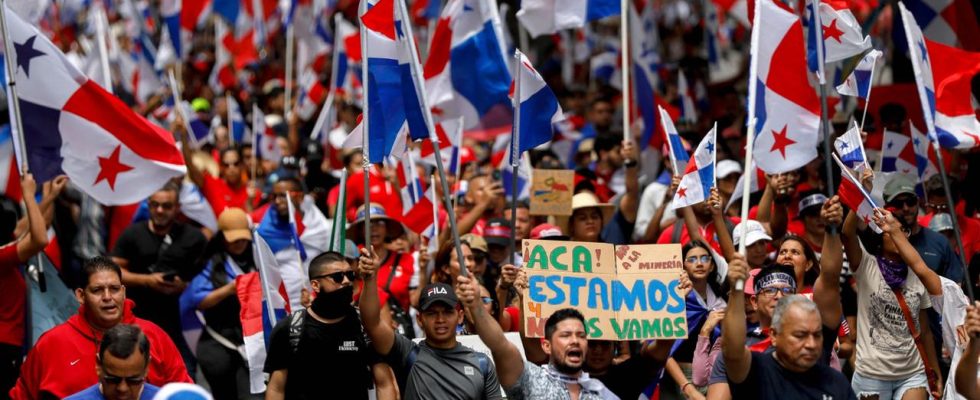For days there have been protests in Panama City against a law that was passed for a Canadian mining project. The demonstrators describe the law as unconstitutional and fear serious consequences for the environment.
At one point, 50,000 people took to the streets in Panama City against the controversial and quickly passed Treaty Law 406. The demonstrators criticized the law as unconstitutional and violating the country’s sovereignty. They also fear that it would also make future international mining projects easier.
It was issued specifically for a current project: The company “Minera Panamá”, a subsidiary of the Canadian company “First Quantum”, is allowed to continue mining copper from a mine in the north of the country for the next 20 years – with an option for an extension. In return for copper mining, Panama will receive annual royalties of $375 million from Minera Panamá. This is what the contract says.
In recent days, demonstrators have loudly called for the cancellation of the contract to operate the largest open-pit copper mine in Central America. The protest is also directed against the contracts of 15 existing mining concessions across the country and 103 new applications that are in the approval process.
Concern about environmental impacts
The Canadian company’s mining practices endanger the ecosystem, criticizes Isaias Ramos from the Centro de Incidencia Ambiental de Panama. International companies, including many from Canada, would make maximum use of the mines and then leave the exploited land behind – with all the social and environmental problems the companies caused.
“And this despite the fact that we already have such a massive water problem,” explains Ramos. “Even if mining creates jobs, the companies are leaving without any added value or development prospects for the local population.” Only the location is being exploited. The population’s concern now is that these types of projects could develop across the country.
Environmentalists warn about the impact of the mines on the environment, and trade unionists warn about the contractual conditions for employees.
Mining also presents opportunities
The demonstrators can now at least claim a small success. Certainly in order to calm the unrest among the population, Congress has now passed a moratorium on metal mining for future projects – it is a temporary postponement.
Zorel Morales from the Chamber of Mines in Panama has no understanding of this. Mining would have contributed a lot to the improvement and sustainable development in the region. The environment would also be taken into account.
“The area where the Canadian mining project is located was actually a protected area – which has never been protected in the past because no government has allocated funds to conserve biodiversity in the area,” says Morales. Now, however, there are actual plans to protect biological diversity.
Contract law is potential unconstitutional
Lawyers warn about the contract law between the state and the Canadian company, which allows the company to expropriate the land if it is needed for mining. Former environmental crimes prosecutor Giovanni Olmas has filed a lawsuit. The environmental studies that are a prerequisite for such projects are missing, he told local media.
“We are missing a lot of information. What progress is being made in the necessary environmental studies? Only on this basis can a decision be made,” said Olmas. “And this information is missing, it was also missing from the vote in Congress.”
The Supreme Court is now set to decide on the unconstitutionality of the contract with the Canadian company, which is currently heating up tempers. Until then, the protests will probably continue.

